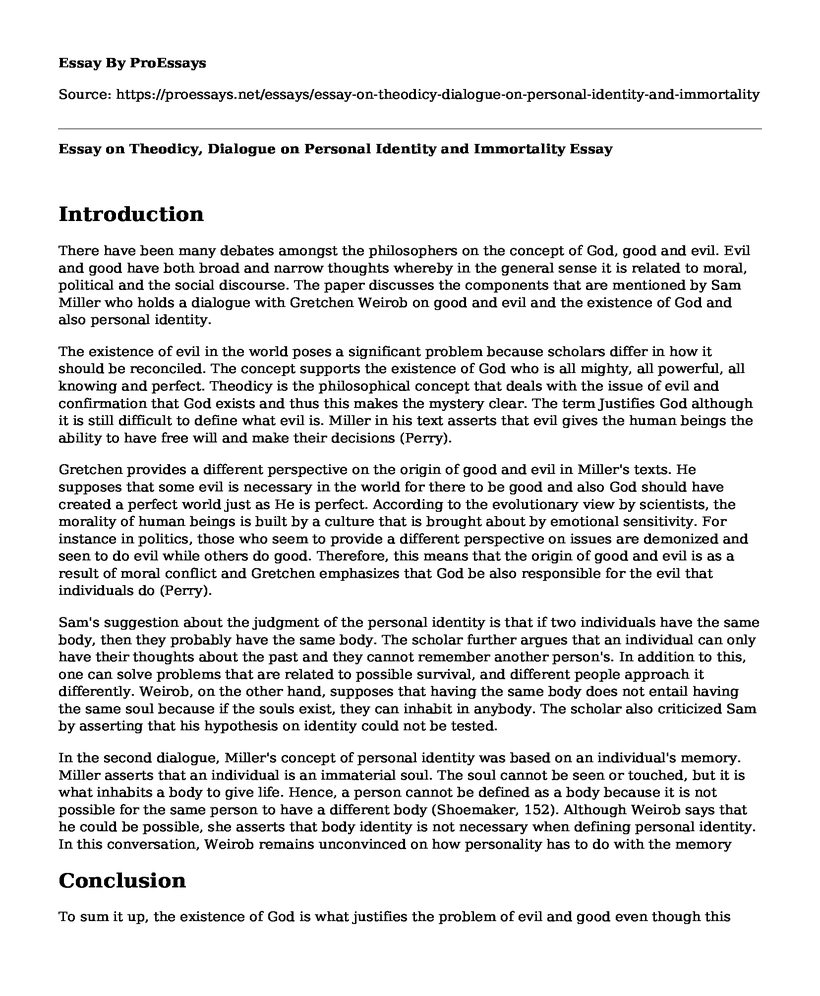Introduction
There have been many debates amongst the philosophers on the concept of God, good and evil. Evil and good have both broad and narrow thoughts whereby in the general sense it is related to moral, political and the social discourse. The paper discusses the components that are mentioned by Sam Miller who holds a dialogue with Gretchen Weirob on good and evil and the existence of God and also personal identity.
The existence of evil in the world poses a significant problem because scholars differ in how it should be reconciled. The concept supports the existence of God who is all mighty, all powerful, all knowing and perfect. Theodicy is the philosophical concept that deals with the issue of evil and confirmation that God exists and thus this makes the mystery clear. The term Justifies God although it is still difficult to define what evil is. Miller in his text asserts that evil gives the human beings the ability to have free will and make their decisions (Perry).
Gretchen provides a different perspective on the origin of good and evil in Miller's texts. He supposes that some evil is necessary in the world for there to be good and also God should have created a perfect world just as He is perfect. According to the evolutionary view by scientists, the morality of human beings is built by a culture that is brought about by emotional sensitivity. For instance in politics, those who seem to provide a different perspective on issues are demonized and seen to do evil while others do good. Therefore, this means that the origin of good and evil is as a result of moral conflict and Gretchen emphasizes that God be also responsible for the evil that individuals do (Perry).
Sam's suggestion about the judgment of the personal identity is that if two individuals have the same body, then they probably have the same body. The scholar further argues that an individual can only have their thoughts about the past and they cannot remember another person's. In addition to this, one can solve problems that are related to possible survival, and different people approach it differently. Weirob, on the other hand, supposes that having the same body does not entail having the same soul because if the souls exist, they can inhabit in anybody. The scholar also criticized Sam by asserting that his hypothesis on identity could not be tested.
In the second dialogue, Miller's concept of personal identity was based on an individual's memory. Miller asserts that an individual is an immaterial soul. The soul cannot be seen or touched, but it is what inhabits a body to give life. Hence, a person cannot be defined as a body because it is not possible for the same person to have a different body (Shoemaker, 152). Although Weirob says that he could be possible, she asserts that body identity is not necessary when defining personal identity. In this conversation, Weirob remains unconvinced on how personality has to do with the memory
Conclusion
To sum it up, the existence of God is what justifies the problem of evil and good even though this only applies to those who believe in his existence. Sam Miller and Gretchen Weirob hold dialogues on the concept of good and evil and also personal identity, and according to the discussions, Weirob does not seem convinced with miller's ideas.
Work Cited
Perry, John. Dialogue on good, evil, and the existence of God. Hackett Publishing, 1999.
Shoemaker, David W. "The irrelevance/incoherence of non-reductivism about personal identity." Philo 5.2 (2002): 143-160.
Cite this page
Essay on Theodicy, Dialogue on Personal Identity and Immortality. (2022, May 26). Retrieved from https://proessays.net/essays/essay-on-theodicy-dialogue-on-personal-identity-and-immortality
If you are the original author of this essay and no longer wish to have it published on the ProEssays website, please click below to request its removal:
- Philosophers Position on God Existence Report
- Identity During the Gezi Protests Essay
- Compare and Contrast Essay on Christianity and Shintoism Approach Towards Healthcare
- Two Proof of God Existence - Paper Example
- Critical Essay on The Book of Genesis
- Essay Sample on Biblical World View
- God vs. Satan: The Battle of Job in the Bible - Essay Sample







